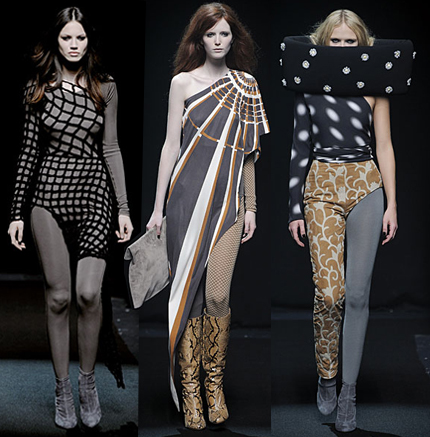
Context: 1998, Fashion Theory Textbook
Author: Alison Gill; Current lecturer of visual communication design at University of Sydney with a PHD in "Wearing Clothes".
Approach: Academic with a mix of Theoretical
Point of View: Deconstruction Fashion, which should not be defined as a negative critique of the fashion industry, serves to change the discourse of fashion away from its established, seemingly intrinsic, codes.
Author: Alison Gill; Current lecturer of visual communication design at University of Sydney with a PHD in "Wearing Clothes".
Approach: Academic with a mix of Theoretical
Point of View: Deconstruction Fashion, which should not be defined as a negative critique of the fashion industry, serves to change the discourse of fashion away from its established, seemingly intrinsic, codes.
Terms:
Deconstructionism: The "undoing" of fashion (see video examples) to create new pieces of "deconstructed" fashion.
Le Destroy: Rebellion style of fashion Gill associates with deconstructionism. Facets of Le Destroy include anti-fashion, recession-zeitgeist, eco-fashion, and theoretical dress
Anti-Fashion: Rebellious form of fashion used to negatively critique normalized fashion codes.
Zeitgeist: literally "spirit of the times"
Ontology: The branch of metaphysics used to deal with the nature of being
Margiela: Fashion designer described by Gill as the first major deconstructionist designer of the 1980's
Derrida: French Philosopher who created "deconstructionist theory" in the 1960's.
Summary:
Alison Gill's "Deconstruction Fashion: the making of unfinished, decomposing and re-assembled clothes" describes the theory of deconstructionism as it relates to fashion. She begins with a history of the term "deconstruction," describing its original terminology as a philosophical theory used to critique language and codes. Deconstruction was then practiced by architects and graphic designers in the 1980's when Martin Margiela began designing deconstructionist fashion. Margiela would take apart the linings from vintage dresses and sell them with the darts, seams, and zipper entirely visible, rethinking the role of fashion to hide its magical construction to create a suitable garment.
Gill then moves on to relation "deconstructionism" to "Le Destroy," describing the practices of anti-fashion (which has some deconstruction elements but is far to focused on negative critique of the industry), recession zeitgeist (which creates a political connection between the instability of eastern european ideologies and an instability of fashion codes), eco-fashion (which emphasizes the use of recycled/eroding materials to send a message for more environmentally friendly textiles), and theoretical fashion (most closely related to deconstructionist fashion in that it links philosophical ideologies to the practice of fashion). Gill claims that "deconstruction fashion liberates the garment from functionality by literally undoing," making the reader ponder exactly the what the functionality of fashion is.
Gill then goes in depth on the term "deconstruction" and its named critique by creator Jacques Derrida. Derrida claims that deconstruction should not be linked to a negative critique (it is not to be called 'destruction') on society, or in this case the normalized fashion industry, but rather the introduction of a new discourse in the way we view the working of social codes. While this type of thinking may be related to post-modernism Derrida is also skeptical to place this label on the term in fear that it creates a temporal confinement that is aligned with a movement rather than a new way of thinking and rethinking.
Lastly, Gill discusses the effects of Media on deconstruction fashion. Gill warns that deconstruction should not be linked, as it has been, to style, but rather the sole mechanics of the creation, un-creation, and re-creation, of a garment. Gill proposes that this type of stripping down of clothing reveals certain truths about the fashion industry that change the way we look at fashion today.
Relevant?: I believe these terms and style of thinking to be relevant today, especially in our claims that we live in a post-modern world. I think the reinvention of not only fashion trends, but the way in which we see and define fashion creates, in itself, an aspect of power over society in that it forces us to think and rethink our own normalized predispositions.

No comments:
Post a Comment